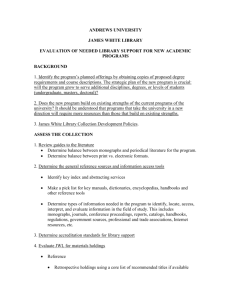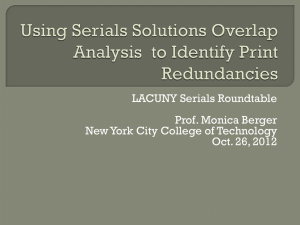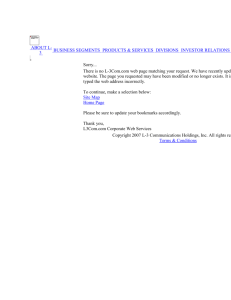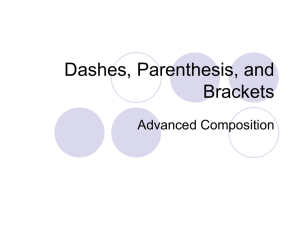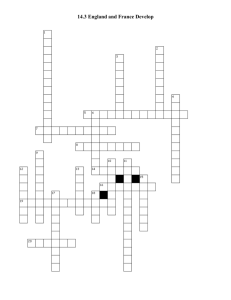Punctuation
advertisement
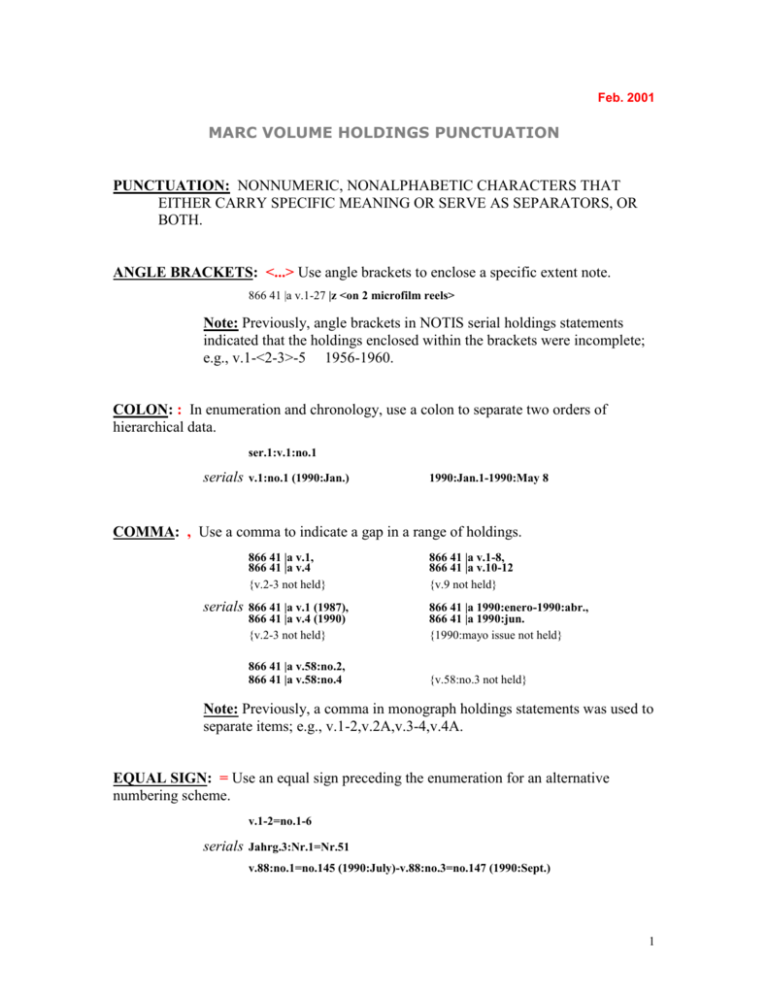
Feb. 2001
MARC VOLUME HOLDINGS PUNCTUATION
PUNCTUATION: NONNUMERIC, NONALPHABETIC CHARACTERS THAT
EITHER CARRY SPECIFIC MEANING OR SERVE AS SEPARATORS, OR
BOTH.
ANGLE BRACKETS: <...> Use angle brackets to enclose a specific extent note.
866 41 |a v.1-27 |z <on 2 microfilm reels>
Note: Previously, angle brackets in NOTIS serial holdings statements
indicated that the holdings enclosed within the brackets were incomplete;
e.g., v.1-<2-3>-5 1956-1960.
COLON: : In enumeration and chronology, use a colon to separate two orders of
hierarchical data.
ser.1:v.1:no.1
serials
v.1:no.1 (1990:Jan.)
1990:Jan.1-1990:May 8
COMMA: , Use a comma to indicate a gap in a range of holdings.
serials
866 41 |a v.1,
866 41 |a v.4
{v.2-3 not held}
866 41 |a v.1-8,
866 41 |a v.10-12
{v.9 not held}
866 41 |a v.1 (1987),
866 41 |a v.4 (1990)
{v.2-3 not held}
866 41 |a 1990:enero-1990:abr.,
866 41 |a 1990:jun.
{1990:mayo issue not held}
866 41 |a v.58:no.2,
866 41 |a v.58:no.4
{v.58:no.3 not held}
Note: Previously, a comma in monograph holdings statements was used to
separate items; e.g., v.1-2,v.2A,v.3-4,v.4A.
EQUAL SIGN: = Use an equal sign preceding the enumeration for an alternative
numbering scheme.
v.1-2=no.1-6
serials
Jahrg.3:Nr.1=Nr.51
v.88:no.1=no.145 (1990:July)-v.88:no.3=no.147 (1990:Sept.)
1
HYPHEN: - Use a hyphen to connect beginning and ending enumeration and
chronology to indicate an unbroken range of holdings in a compressed holdings
statement. In serials, open-ended holdings statements end with a hyphen.
v.1-4
{caption not repeated after hyphen}
v.1pt.1-3 ser.1:v.1:no.1-5 v.1:pt.A-C
serials
no.3 (1987)Nr.5 (1976)-Nr.9 (1980)
{caption repeated after hyphen}
ser.3:v.1 (1990:Jan.)-ser.3:v.7 (1990:July)
PARENTHESES: (...) Use parentheses preceded by a blank space to enclose
chronology when recorded with enumeration. Parentheses are usually used only for
recording serials holdings.
Bd.12 (1973)
PLUS SIGN: + Use a plus sign followed by a blank space to indicate multiple basic
bibliographic units and secondary bibliographic units (accompanying material both
monograph and serial) recorded in field 866. Supplements and indexes to serials,
recorded in fields 867 and 868, are not preceded by a plus sign.
866 41 |a 1 Indian drum
866 41 |a + 1 feather headband
866 41 |a + 3 wampum
866 41 |a + 1 trail guide
{holdings for a kit}
serials
866 41 |a 3 microfiches
866 41 |a + “Pamphlet”
{accompanying material}
866 41 |a v.1-2
866 41 |a + 2 microfilm reels
866 41 |a no.1 (1987)-no.4 (1990)
866 41 |a + “Membership directory” 1987-1990
866 41 |a v.1 (1960)-v.30 (1989)
867 41 |a 1960-1989
{main holdings}
{supplement}
QUESTION MARK: ? Use a question mark to show an unknown quantity in a date
(serials chronology only). Use it ONLY to replace the last digit in a date; do not use it
after an uncertain date.
1950-197?
not: 1950-1976?
QUOTE MARKS: “...” Use quotes to enclose the title or supplied designation for
accompanying material. Leave one blank space before the enumeration, if any.
“Teacher's guide” v.1-2
2
“Ergänzungsband”
serials
“Membership directory” 1987-1990
SEMI-COLON: ; Use a semicolon to indicate a non-gap break in holdings–a gap that
occurs because a part will NEVER be published.
866 41 |a v.1-5;
866 41 |a 1st ed.-8th ed.;
866 41 |a v.7-9
866 41 |a 12th ed.-14th ed.
{v.6 will not be published} {9th ed.-11th ed. will not be published}
SLASH: / In enumeration, use a slash to indicate combined numbering (e.g., double
volumes). In chronology, use a slash to indicate that the part covers a noncalendar year or
multiple years, months, etc. Keep the slash in a compressed holdings statement.
v.1/3
serials
v.1/2 (1990/91)
v.1/2-9/10
v.28:no.1/3 (1990:Jan./June)
For clarity, in exceptional cases where combined volumes cover noncalendar
years, replace the middle slash with a hyphen.
1980/1981-1981/1982
{not: 1980/1981/1981/1982}
Note: Previously, a double slash in NOTIS serial holdings statements
indicated that the title had ceased publication with the volume preceding
the double slash; e.g., v.1-10// 1960-1969//.
SQUARE BRACKETS: [...] Use square brackets to indicate supplied or corrected
chronology. This applies in particular when dates must be converted to the Gregorian
calendar.
serials
866 41 |a kerekh 1 (657:Heshvan) [1896:Oct.]-kerekh 46
(686:Elul) [1926:Aug./Sept.] |z <in 477 microfiches>
Note: Previously, square brackets in UTLAS (ISM) serial holdings
statements indicated that the holdings enclosed within the brackets were incomplete; e.g.,
v.1-[2-3]-5 1956-1960. The NOTIS load converted them to angle brackets, and they
stayed as angle brackets during the Aleph load.
Written by: Barbara Finlay and revised by Pat Riva
Last revised: Feb. 2001
3
